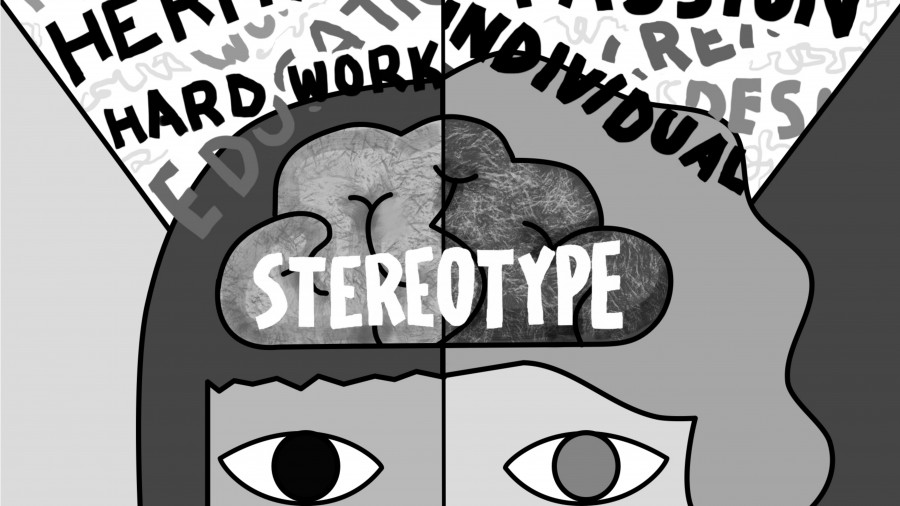Pushing Past the Asian-American Stereotype
At our school, the highly academic environment and race to enter selective, elite colleges has made the Asian-American stereotype more and more relevant. The Asian-American population at our school is an integral part of what defines the campus, and it is important to understand that many preconceived stereotypes about Asian-American success stem from a complex range of factors, not just strict parent or inherent intelligence. The root of the stereotype has grown from the idea that in the United States, everyone has the opportunity to achieve their ultimate goal with enough hard work.
To fully understand the stereotype of Asian-American success and academic achievement, it is essential to first make a distinction between families that are Asian-American and those who are first-generation immigrants.
“I know for sure from my experience that families that come to America want [children] to attain the American dream, which is essentially to have a lot of money, to be successful and to have a big house, so they push their kids a lot,” sophomore An Huynh said.
Asian-Americans began as immigrants — they came to America to seek a better life for themselves and a brighter future for their children, just like any other immigrants. Hard work is embedded in their culture, both as a common value deeply rooted in Asian traditions tracing all the way back to ancient Confucian principles and as a survival skill honed through thousands of years of strife. An immigrant who does not work hard doesn’t survive in a new land; in the same way, Asians who have come to the United States have made success their goal and therefore, have emphasized hard work in order to achieve this idea of the “American Dream.”
The competitive atmosphere bred by this idea that Asians, especially immigrants, should be high achievers, academically and in life, pushes some to thrive and step up to the challenge. It is typical human nature to want to go with the flow directed by one’s environment and culture. This is more so true if one is a first-generation American in their family.
“[The stereotype] has benefited me,” sophomore Hannah Pang said. “I’ve been pushed into doing a little bit better that way and seeing others do that makes me want to be more successful. I mean obviously, when you’re younger, it’s not the greatest. Everyone thinks you’re super smart, but I’m not. [However], as you grow up and people get more mature, that goes away.”
While this self-competition and community influence pushes some to adopt new habits, leading to success, others experience an alternative reality and gravitate toward the opposite end of the spectrum. It is easy to resent such a stereotype, especially one in which only academic perfection seems adequate. It’s also common knowledge that everyone is different and that those who do not fit into the classic stereotype of loving or pursuing math, science or other STEM fields tend to suffer as a result of the stereotype.
Even if all Asian families were to push and advocate that education and hardwork are the only ways to success, it’s the children’s choice to carry this burden, and often these decisions can carry negative effects for the students and individuals who are afflicted with them. The equally hard work that an Asian-American does sometimes doesn’t receive the praise it might receive when accomplished by a person of another ethnicity.
“I wouldn’t say it’s a bad thing,” An said. “It’s kind of like a double-edged knife, where you’re always given the benefit of the doubt that you work hard and you’re smart, but then at the same time there’s the whole ‘She’s Asian, she’s smart’ thing. It undermines how much work you put into the things you do, and it’s especially harmful to people who don’t fit the particular stereotype.”
Overall, the ideals adopted by individuals who can be categorized as stereotypical Asian-Americans don’t come from the idea of natural intelligence. They are bred by the influence of a hardworking heritage ingrained in hundreds of years of history and growth through the support of education and family success. It’s about the influence and habits these students develop from their familial traditions that help define who they will later become.
The idea that Asian-American students’ focus on education and academics is catalysed by family values is true for some, but it’s just a small scope of a fuller picture. Often students pour themselves into heavy workloads to support or meet expectations set by family as well as to satisfy their own expectations.
The environment in which an individual may grow up and the influence of the Asian-American stereotype do have an effect, but only in introducing the idea of success and education being a top priority. For any students’ performance rates to actually increase, they must identify with the idea of hard work and make active efforts in pursuing this ideal of success based on education.




Taurayi | Jan 29, 2017 at 10:39 pm
Quite an incisive article. Indeed it is not only the pressure from parents or family values that translates to a child doing well. The child/student has to make a concerted effort and conscious decision to work hard to attain a high standard of grades.
True that it does at times put a tremendous amount of pressure on some students such that it may actually have a negative impact in their lives.
An interesting read.